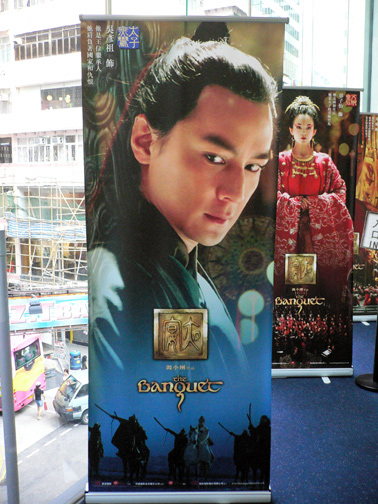
THE BANQUET
China, 2006, 131 minutes. Colour.
Ziyi Zhang, You Ge, Daniel Wu.
Directed by Xiaogang Feng.
The Banquet has its origins in Shakespeare’s Hamlet. There is a prince, moody, in exile. There is an emperor who is murdered, his brother marrying the widow. There is also a play within a play and the culmination at a banquet which abounds in treachery and death. However, the film is not an exact parallel or version of Hamlet.
The film is beautiful to look at, no expense spared in presenting beautiful sets, the palace, the school where the prince learns singing and dance. The same is true of the costumes, lavish for the palace, white and simple for the school.
This is also a martial arts film in the vein of Crouching Dragon, Hidden Tiger. There are many battles, many fights – with characters flying and swooping through the air.
The combination of all these elements make for a very stylised piece of theatre, a stylised action film, a psychological drama – as well as a glimpse of history of the 8th century AD.
Director Xiaogang Feng made two films at this time which received international release, A World Without Thieves, Assembly.
1. An art film? A historical film? A spectacle? Martial arts? History of China?
2. The adaptation of Hamlet, the plot elements, the characters, the situations? Inserted into Chinese history? The differences and variations? Audiences and their knowledge of Shakespeare, or not?
3. The importance of the visuals, the period, the palaces and décor, war and battles? The actors, mime and dance? Martial arts, leaping and flying? The interiors and the drama? The melodramatic culmination?
4. The history of Chinese empires, divided empires, social chaos, armies, battles, loyalties and betrayals? The information about the emperor, his young wife, his being killed, his brother taking over, ambitions?
5. The attack on Prince Wu Luan? His exile at the school, his fellow students and their being masked, the military coming, the fights, the students being massacred? The prince being underwater and saved?
6. Life at the court, the emperor and his establishing himself, his marrying the empress? The bond between them – and the fidelity and infidelity of the empress to her first husband? Her infatuation with the prince? The massage sequence and the sensuality between the two? The bonds of love and of power?
7. Qing Nu and her love for the prince, in the court, the jealousy of the empress, having her flogged and the vividness of this sequence? Her father, his role as adviser, her brother and his feelings of vengeance?
8. The return of the prince, his life at the court? The play within the play – and the re-enactment of the murder? The reaction of the emperor? Empress?
9. The prince and his being established at court, the emperor wanting to get rid of him, sending him to an exile as a delegate? The massacre on the way? The prince rescued? His being hidden by the enemy, his reappearance?
10. Life at court, the empress and her change? The role of poison in the intrigues of the court?
11. The plot with the emperor’s adviser, his son? The daughter, her singing, the banquet and her illness, her death?
12. The prince, the swordplay, the deaths during the banquet?
13. The banquet itself, lavish, the various ambitions of those participating? The intrigues, the poison, the poisoned swords? Deaths?
14. The end of the play – no rehabilitation as at the end of Hamlet? The end of an era? Tragedy, Chinese style?